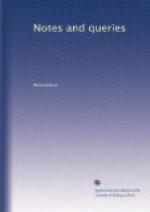J. PAYNE COLLIER.
Kensington, Jan. 21. 1850.
* * * * *
MINOR QUERIES.
Christmas Hymn.—Can any of your readers inform me who was the author of the well-known Christmas Hymn, “Hark the Herald Angels sing,” which is so often found (of course without the slightest shadow of authority), at the end of our Prayer-Books? In the collection of poems entitled Christmas Tyde, published by Pickering, the initials “J.C.W.” are appended to it; the same in Bickersteth’s Hymn Book. In the last number of the Christian Remembrancer, it is incorrectly attributed to Doddridge, who was the author of the other Christmas Hymn, “High let us swell our tuneful notes,” frequently appended to Tate and Brady; as well as of the Sacramental Hymn, “My God and is Thy table spread?” If the author of this hymn cannot be determined, it would be interesting to know its probable date, and the time when this and the other unauthorised additions were made to our Prayer-Book. The case of Doddridge’s hymn is more remarkable, as being the composition of a dissenter.
E.V.
On a Passage in Pope.—“P.C.S.S.,” who is old-fashioned enough to admire and to study Pope, would feel greatly obliged if any of your correspondents could help him to the interpretation of the following lines, in the “Imitation” of Horace’s Epistle to Augustus:—
“The Hero William, and the Martyr Charles, One knighted Blackmore, and one pensioned Quarles, Which made old Ben, and sturdy Dennis swear, No Lord’s Annointed, but a Russian bear!”
The passage in Horace, of which this purports to be an “Imitation,” is the well-known
“Boeotum in crasso jurares aeere natum,”
and it is clear enough that Pope meant to represent kings Charles and William as so devoid of the taste which should guide royal patronage, that, in selecting such objects of their favour as Blackmore and Quarles, they showed themselves to be as uncouth and unpolished as the animal to which he likens them. But the principal motive of this inquiry is to ascertain whether there exist in their writings any record of the indignation supposed to have been expressed by Jonson and Dennis at the favour shown by majesty to their less worthy rivals.
P.C.S.S.
Discovery of the Circulation of the Blood.—There is a passage in Longinus (ch. xxii.), familiar perhaps to some of the readers of the “NOTES AND QUERIES,” which indicates that the fact of the circulation of the blood was well established in the days of Plato. The father of critics, to exemplify, and illustrate the use and value of trope in writing, has garbled from the Timaeus, a number of sentences descriptive of the anatomy of the human body, where the circulation of the blood is pointed at in terms singularly graphic. The exact extent of professional knowledge arrived




